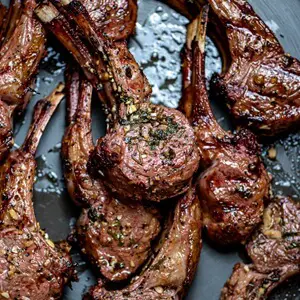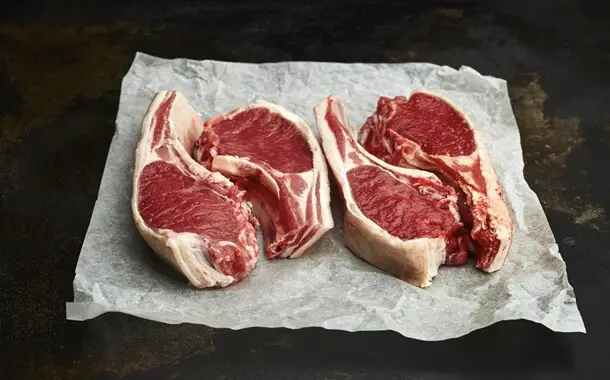How Much Do Lamb Chops Cost?
Last Updated on February 12, 2024
Written by CPA Alec Pow | Content Reviewed by ![]() CFA Alexander Popinker
CFA Alexander Popinker
Lamb chops are considered a gourmet cut of meat and a delicious, though often pricey, ingredient for recipes. But how much do lamb chops actually cost? The price per pound can vary quite a bit based on the source, quality, and cut of the chops.
Highlights
- Average Price: $9 – $17 per pound for conventional chops, or $14 – $26 per pound for premium organic lamb.
- Biggest Price Factors: Quality grade, breed, diet, location, cut, and season.
- Best Money Saving Tips: Check sales, buy bundles, choose shoulder over loin, and use sparingly in dishes.
- Make Lamb Economical: Use marinades, stew meat, make sandwiches, and cook bone-in shanks.
How Much Do Lamb Chops Cost?
Overall, expect to pay anywhere from $9 to $17 per pound on average for conventional lamb chops purchased from a grocery store or butcher shop. Organic and premium grass-fed lamb chops tend to cost $14 to $26 per pound on average.
Farmer’s Fresh Meat offers fresh-cut lamb chops at a price of $19.99 per pound.
Red Barn Meats provides lamb shoulder chops at a price of $13.81 per pound and lamb loin chops at a price of $16.46 per pound.
Billy Doe Meats sells lamb chops at a sale price of $23.99, with a regular price of $21.99.
D’Artagnan offers various lamb products, including lamb porterhouse chops at a price of $75.99, lamb rib chops, and other cuts at different prices.
Vincent’s Meat Market sells lamb chops at a price of $21.50 to $42.99.
The exact price will depend on factors like the retailer, season, region, supply levels, and specific type of chops.
Why Are Lamb Chops Pricier Than Other Meats?
Lamb tends to cost more than beef, chicken, and pork for a few key reasons. First, sheep are raised in smaller numbers than cows, pigs, and chickens, so the supply is lower. Lamb and mutton account for only about 1-2% of total meat consumption in the U.S.
Secondly, sheep take longer to raise to full size compared to other livestock. It takes about a year before a lamb is ready for slaughter. The longer time investment makes lamb more expensive.
Finally, there is higher demand for lamb as a specialty gourmet ingredient. Because lamb chops are considered a delicacy, particularly in higher-end restaurants, suppliers can charge a premium. The perceived value contributes to the higher costs.
Price Range at Different Suppliers
Where you buy your lamb chops will impact how much you pay per pound. Here is what to expect at various suppliers:
- Grocery Stores: $9 – $15 per pound for conventional chops. Organic chops run $16 – $22 on average.
- Butcher Shops: $12 – $17 per pound for high quality lamb from a local butcher. Custom cuts from specialty shops will be even higher.
- Big Box Stores: $11 – $14 per pound for frozen imported conventional lamb chops.
- Warehouse Clubs: $9 – $12 per pound for family packs of lamb chops. Bulk savings applies.
- Farmer’s Markets: $14 – $22 per pound direct from family farms. Access to grass-fed lamb.
- Online: $16 – $26 per pound for premium quality chops shipped overnight.
Factors Influencing the Price
Several factors impact the retail price per pound shoppers will pay for lamb chops:
Breed and Diet
- Grass-fed lamb with access to pasture costs more than conventionally grain-finished lamb. The specialized diet and farming practices increase expenses for farmers.
- Imported lamb like from Australia/New Zealand is cheaper than domestic lamb from small farms.
- Heritage and premium breeds command higher prices than standard commercial breeds.
Cut and Quality Grade
- Loin lamb chops are the most expensive, followed by rib chops, then shoulder chops.
- Higher USDA quality grades like Prime and Choice mean higher prices than Select grade lamb.
- Organic certification costs more due to required farming practices. Organic chops can be 20-30% pricier.
Location and Season
- Prices are higher for lamb raised in areas like the Pacific Northwest and Northeast where production is lower.
- Spring is peak season when lambs are abundant, so prices are lower. Late fall and winter see higher costs due to lower supply.
- Buying near the source (farms, ranches) is cheaper than purchasing through retail channels.
Comparing Lamb and Other Meats
Here is how conventional lamb chops tend to compare in price versus other popular types of meat:
- Chicken Breasts: $3 – $6 per pound
- Pork Chops: $4 – $7 per pound
- Beef Steaks: $7 – $13 per pound
- Lamb Chops: $9 – $15 per pound
So on a per pound basis, lamb is approximately 1.5 to 2 times more expensive than other meats, on average. Of course, prices fluctuate. Sales can occasionally put lamb prices on par with beef steaks.
Best Money Saving Tips
 Here are some tips to get the best deals when purchasing lamb chops:
Here are some tips to get the best deals when purchasing lamb chops:
- Check weekly ads and buy lamb chops when they go on sale. Prices can be 25% lower.
- Buy in bulk when lamb leg of lamb roasts are discounted, and slice into chops yourself.
- Choose shoulder chops instead of pricier rib or loin chops. They cost 25% less but are just as tasty.
- Buy frozen lamb imported from Australia or New Zealand to save around 30%.
- Purchase whole or half lamb directly from local farms during peak spring season.
- Join a community supported agriculture (CSA) program to source affordable lamb shares.
- Use lamb sparingly in dishes like soups, curries, and ragus. A little goes a long way!
Economical Cooking With Lamb
You don’t have to break the bank to enjoy lamb chops in your cooking. Here are some budget-friendly ideas:
- Marinate less expensive shoulder chops in Greek yogurt, lemon, garlic, and oregano. Grill and serve with veggies.
- Sear lamb chop medallions then make a hearty stew with lots of affordable root vegetables.
- Use just one or two chops to flavor loaves of bread, pastas, rice dishes, and risottos. A small amount packs lots of flavor.
- Turn leftover bits of lamb into next-day sandwiches, flatbreads, tacos, or empanadas. Use every last bite!
- Swap half the ground meat in recipes like burgers, meatballs, and meatloaf with ground lamb. It adds dynamite flavor for less money.
- Cook bone-in lamb shanks which cost just $5 to $8 each. Braising brings out their luxurious, meaty flavor.
Is the Splurge Worth It?
While less expensive than other specialty meats like beef tenderloin, lamb chops are still a splurge for many shoppers. Consider your budget and how often you will realistically cook lamb at home before buying.
That said, the unique flavor can be worth the occasional extra cost, especially for special occasions and festive meals. The rich taste and tender texture of high quality lamb is difficult to duplicate with other meats. Just a few chops can elevate a meal.
Opting for pasture-raised, local, or organic lamb supports smaller sustainable farms. So the higher prices help hard-working ranchers and farmers provide specialized products. From an ethics standpoint, this is worth considering.
No matter what, always use lamb mindfully. Look for deals, choose economical cuts, and make leftovers last. With smart shopping and cooking, lamb chops can still be an enjoyable ingredient for most budgets.
Final Words
How Much is 1Kg of Lamb Chops?
The average cost for 1 kilogram (2.2 pounds) of lamb chops ranges from $20 to $40. However, prices vary significantly based on the source, quality, and cut of the lamb chops.
Specifically, you can expect to pay:
- Supermarkets: $20 – $30 per kg for conventional lamb chops.
- Butcher Shops: $26 – $38 per kg for premium butcher lamb chops.
- Organic Stores: $28 – $44 per kg for certified organic, grass-fed lamb chops.
- Online Specialty: $36 – $50 per kg for top-grade imported lamb chops shipped overnight.
At the low end, discount grocery stores may charge as little as $18 per kg when they offer special sales on frozen New Zealand lamb. At the other extreme, you could pay up to $60 per kg for the finest heritage breed lamb chops purchased directly from a sustainable family farm.
When estimating costs, keep in mind that a kilogram is 2.2 pounds. The pricier rib and loin lamb chops will make the total price for a full kg higher as well. Arm and shoulder chops are more economical.
In most cases, expect to pay around $25 per kg or $11 per pound for reasonably good quality lamb chops from the grocery store. This lets you enjoy the flavor without overspending, making lamb accessible for regular home cooking.
Is Lamb Cheaper Than Beef?
When comparing lamb versus beef prices, lamb generally costs more per pound. On average, expect to pay $9 – $15 per pound for lamb chops, while beef steaks average $7 – $13 per pound.
However, there are times when lamb costs the same or less than beef:
- When beef prices rise due to shortages or demand increases, lamb can dip below or match beef costs.
- Lamb shoulder chops and stew meat are cheaper than beef steaks, averaging only $2 – $3 more per pound than ground beef.
- Grass-fed lamb can be priced similarly to premium grass-fed beef cuts like ribeye and NY strip.
- Imported lamb from Australia and New Zealand is often cheaper than USDA domestic beef.
- When purchased directly from family farms, lamb deals can beat grocery store beef prices.
- Select grade lamb chops are comparable to, if not cheaper than, choice beef steaks.
So while generally more expensive, there are opportunities to purchase certain lamb products for less than beef depending on cut, grade, origin, and market factors. Checking ads and buying bundles can lower costs. Overall lamb remains pricier due to lower supply, but smart shopping can close the gap.
Is Lamb Worth Eating?
Definitely! Lamb has a distinct rich, meaty, savory flavor that is considered a delicacy. The tender, juicy cuts like chops and leg of lamb are excellent for grilling, roasting, or broiling.
Here are some top reasons that quality lamb is worth eating:
- Unique taste profile compared to beef, pork, and chicken
- Tenderness rivals fine steak cuts
- Nutrient-dense with iron, zinc, and B-vitamins
- Versatile for Mediterranean, Middle Eastern, and Indian cuisines
- Special occasion meal appeal
- Supports smaller sustainable ranches
- Humanely raised on many small farms
- Novel alternative to more common meats
While expensive, lamb is worth splurging on occasionally for memorable meals and a break from routine proteins. Even budget cooks can utilize affordable lamb shanks, stew meat, and ground lamb to add distinctive flavor to weeknight meals. With its incomparable flavor, lamb provides an eating experience well worth having.


Leave a Reply
Want to join the discussion?Feel free to contribute!